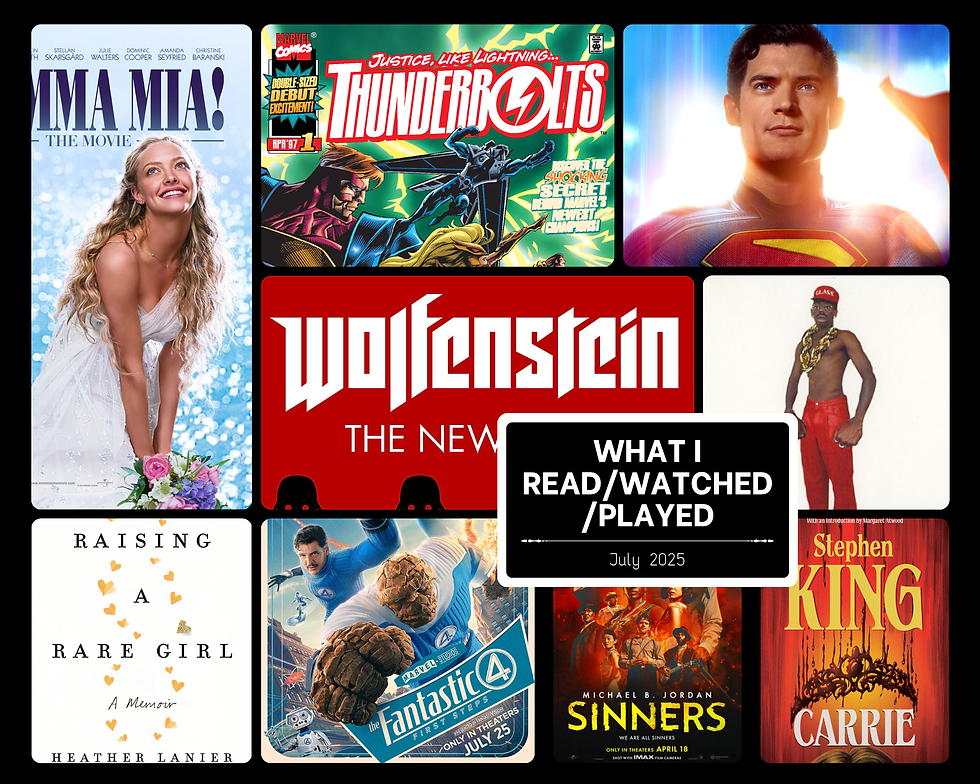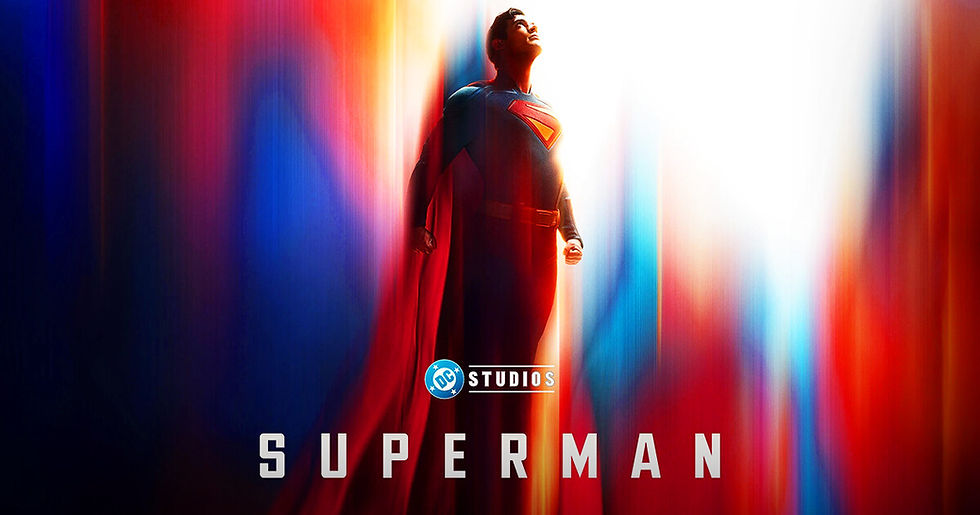That Good: New Wolfenstein
- buckleyadam2814

- Aug 7
- 24 min read
Welcome back to That Good, a series where I, a self-described hopeless pedantic, take a closer look at critically acclaimed work determine if its really "That Good." Recently, to weather the onslaught of insanity that is the year 2025, I looked to a time-honored coping mechanism: killing Nazis. Today, we're talking about the Nazi killing video game franchise, Wolfenstein; more accurately, the 2014 reboot The New Order, and its following games The Old Blood and The New Colossus for greater context. Are these games really modern classics, or should they be left behind in the 8th generation of gaming?
For That Good posts going forward, I'll be trying to keep spoilers to a minimum, as I want this to serve as a recommendation series of sorts, but you can breathe easy knowing I'll sill be supplying that classic, brutal honesty you've come to know (and love) from my commentary. This is an overview of the series, so I will be going over the general plot and gameplay for every game. Be warned.
The New Order:
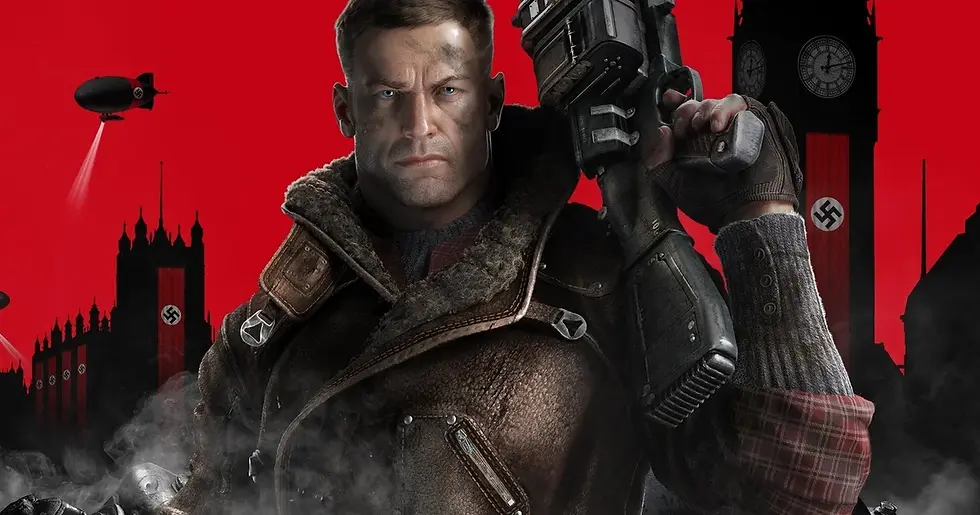
Wolfenstein: The New Order came out in 2014, which was a pretty stacked year. I'm talking The Last Of Us, Bayonetta, GTA V, and Destiny, all of which I'd call "modern classics," as a decade later, these games still largely define the video game industry of the 2020's with their influence. The New Order fits right among these, as without it, we don't get Id Software's 2016 reboot of Doom, which became a cultural juggernaut on its own. Its an interesting case, however, as this game has more in common with its previous generation peers (Bioshock Infinite, Dishonored) than what would come after, and that's not necessarily a slight. After finishing The New Order (let's condense that the TNO, shall we?) I simply thought, "They don't make games like this anymore, do they?"
To set the stage, TNO reboots the Wolfenstein franchise by making it an alternate reality story where, instead of the Allies defeating the Nazis in 1945, the war carries on and the Nazis win. Our stalwart protagonist, William Joseph "BJ" Blaskowicz, is grenade-d into a coma from 1946 to 1960, where he wakes up and finds out what's become of the world. BJ then awakes the world from its own slumber as he reignites resistance in Europe by taking the fight back to the Nazis. Its a gritty, dieselpunk makeover to the granddaddy of first-person-shooters, and in its finest moments, its some of the most sublime fun the genre can offer.
I wanted to get gameplay out of the way since I have a lot more to say about the world and characters (shocker). Simply put: I struggled with it, both in terms of design and difficulty. You can cry "skill issue" and I won't argue, as I did have to lower the difficulty to get through some areas. The shooting itself is solid, boasting chunky sound effects, dual-wielding action, and damn good weapon design. A detail I especially love is the different weapons found in 1946 vs 1960, as you can see the lineage of these WW2 firearms in their futuristic '60 versions. The only real issue I have with the shooting is how tight aiming can be. Readability is at an all-time low thanks to the generally dim lighting and desaturated color palette. The game's art direction is amazing, so much so that it counteracts the aging graphics, but visually, it can feel like a lost Gears of War with how dull the actual world looks.
When you're not unloading dual shotguns into mechanical monsters, you're engaging line-of-sight stealth. I actually quite like the general design, which inclines the player to take out high ranked commanders first so they don't summon reinforcements when you go loud. The only way to identify commanders is by a meter that tracks their distance from you, forcing you to explore the area and get close. Its a good system that is better utilized in the future games, but here, I appreciated the option, since I am, admittedly, bad at the shooting. Like most obligatory stealth systems, at worst, its an entree to a firefight, but at its best, it feels pretty good to cut a number of enemies down before the real fight starts. My biggest issue here is that you're never able to get one over on the game. You might be able to navigate a room silently, but you'll never really get to leave enemies alive before continuing. I'm not advocating for sparing the lives of Nazis, only that I wish I got to feel the satisfaction of not having to face combat because I excelled at stealth.
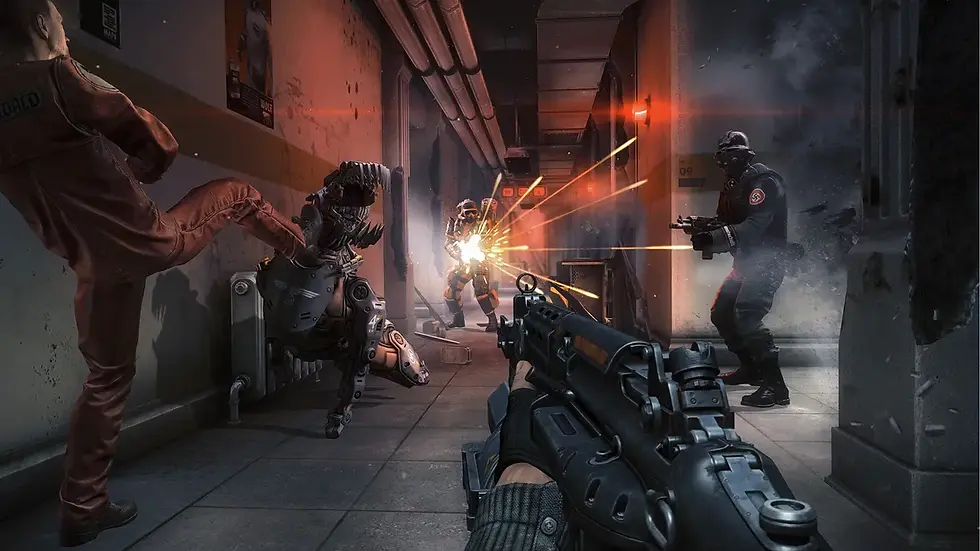
Stealth can be heart-racing because the game has an undeniable horror aspect. There are multiple sequences in this game that are really tough to watch, in addition to the story having straight up jumpscares at times. The terror extends to the gameplay, as enemy density can force you to play cowardly, which is one of my gripes. Sure, if I played on easy mode the entire time, maybe I could have better played the way the game wanted me to, but honestly, I'm not exactly sure how the game wanted me to play at all. With how much pressure enemies put on you, I never felt like I had to resources to properly run-and-gun. At times, you're forced to cling to any cover you can find like this is a Call of Duty campaign. You can peek around corners to facilitate this, but this is the worst, most boring way to play, so I only used it when I had to. My biggest obstacle was the game's auto-checkpoints, which, after death, would sometimes throw me to the wolves with little ammo, health, and armor. Moments like these are when I lowered the difficulty just to get through the story.
To break up the core gameplay, you might be thrust into a vehicle, like a solo submarine or a mech, and these are fun novelties that don't overstay their welcome. Most of the time, however, you're navigating enemy territory with the bane of my existence: the LaserKraftWerk. This laser tool is used to cut chains and burn through metal siding. It also doubles as a weapon, meaning it takes up a spot on your weapon wheel. In a vacuum, that's not a problem, except this game has one of the worst weapon wheels I've had the displeasure of using. This might have been a bug, but when I quick-switched weapons in combat with the triangle button, I'd often switch to the LaserKraftWerk, which, unless charged, is absolutely useless. Oh, and because the weapon wheel doesn't freeze combat while in use, switching to a different weapon put me in danger. This random switching caused me numerous deaths, which was defeating, as I died not because I lost fighting an enemy, but fighting the game itself.
So if I didn't really gel with the gameplay, why did I continue playing these games? Well, the combat does have its moments, but the story and world of the game is what these games unique. Wolfenstein has always been the pulp comic version of WW2, and the new games double down on that. TNO's story isn't gripping because its filled with deep, memorable characters, or has a deftly designed plot—because it doesn't have those things—but what it does have is a perfectly realized world that never ceases to be amazing to discover. This version of 1960, in all its anachronistic glory, unfolds in spectacular fashion as you traverse all over Europe, and even the moon, to topple the Nazis. Whether you're blowing up strongholds, infiltrating concentration camps, or capturing U-boats, you're learning about this new world alongside BJ.
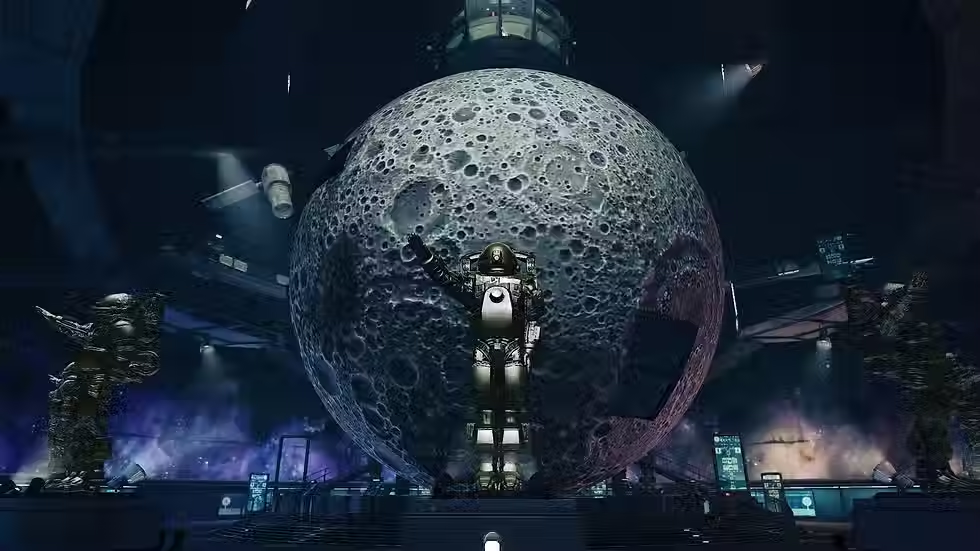
At the beginning of the game, in 1946, you must make the choice to sacrifice one of your fellow soldiers, and this results in branching timelines where the other survives. Each has their own distinctions, but for my first and only playthrough, I spared Wyatt instead of Fergus, and it didn't feel like a standard video game choice; it felt like I was genuinely making an impact on the story. Wyatt surviving felt like the right choice, just as saving Fergus might be for another player. I look forward to playing TNO again and choosing Fergus, as I'm interested in the differences. While the choice only results in aesethic differences, its central the game's identity as an alternate history tale.
Something I'd pay more attention to on a second run is the home base in Berlin. Between missions, you return there, and as such, its an ever-changing space as new characters come and go. Frankly, I didn't find myself spending too much time here, but clearly, there are extras to be enjoyed. It reminds me of Dishonored's Hound Pits Pub, a central location filled with all your comrades that you sometimes have to do missions in. Its nothing special, but I wanted to acknowledge that it is a consistent part of the game, and that the player can indulge in it to whatever degree they want to.
Circling back to the horror of this game, I really do think its a defining aspect of its story and world, and this materializes in how its portrays the Nazis. TNO walks a thin tightrope of making Nazis simultaneously ridiculous, terrifying, and painfully human. General Deathshead takes care of the terror, as there's very few sequences that have chilled me more than having to choose between Wyatt and Fergus, knowing what will happen to the other. Frau Engle takes care of the ridiculousness. She's represents the ego of the Nazis with her Aryan obsession, the petty vanity of it. This series loves to have these No Country For Old Men "Call it" moments with its Nazi antagonists, where they really turn up the villain charisma and make an impression of the player. The player is trapped in these interactions just like BJ is. What this technique does is demonstrate that, while the scene is set similarly, these commanders aren't just plug and play. They have quirks. Personality. Humanity. By entertaining the player, by being scary, funny, or intimidating, they prove that they are individuals. Even the grunts've got it. Overhearing their conversations reminds you that Nazis, whether or not we like to admit it, are people. Some are true believers, others opportunists, and some doubters, but they will fall to our bullets regardless. Nazis are humans, just like us, and the horror of that is inescapable.
I love everything about this approach because, for one, it makes the killing have impact, and two, its a stark, but important reminder, that Nazis make the choice to be Nazis. The urge to see a Nazi as no longer human is strong, and one might argue that this, in and of itself, is just as bad as being a Nazi. I disagree. Nazis see others a subhuman because of the circumstances of their birth, whereas one might see a Nazi as subhuman because of their choices. Myself, I'm not in the business of seeing anybody as subhuman. A Nazi is contemptible because they have hate in their heart, and hate is a choice. Why this game has aged well is, in part, its reluctance to delight too much in the killing. It doesn't want congratulations for killing Nazis. It presents it as necessary, so why would it? What makes modern portrayals of Nazis sometimes ineffective is this "hell yeah!" attitude some stories take, where they want cheers from the audience for putting Nazis through the grinder. Wolfenstein sidesteps this by having the audience do the killing themselves, and lessons non-video games can take is that its easy to ignore the humanity in Nazis, and its much harder to recognize it and still pull the trigger. This is what Wolfenstein wants us to consider. Sure, this is a series where you fight mecha-Hitler, go to the moon, and jump around in ancient robot armor, but The New Order takes itself seriously, and dares you to do so, as well.
Lastly, let's talk about the main man himself, BJ. No discussion of this series is complete with diving deep into his character, as he's a contributing factor in what makes this game unique amongst its peers. While other shooters, like Bioshock Infinite or The Last of Us: Part 2, want to critique the violence it makes the player indulge in, Wolfenstein shuts this down. The villain can't hit us with the old "look at how many of my goons you've gunned down; maybe you're the real villain!" because the villains here are Nazis. No matter how many of them we slaughter, they have no leg to stand on. Instead, we reflect on how the violence characterizes BJ. Deathshead wants to reduce him down to a blunt instrument of destruction, but we know he's so much more.
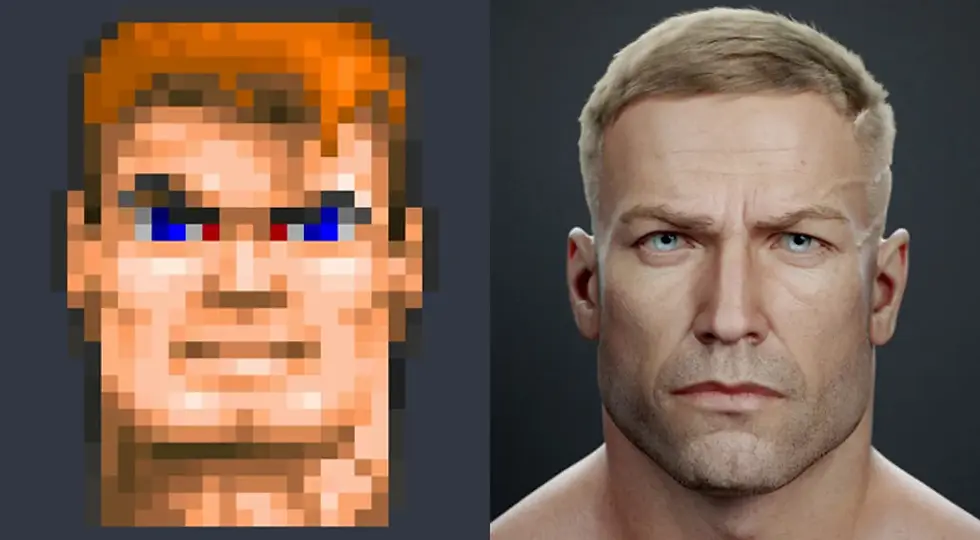
The New Colossus and The Old Blood go into BJ's backstory specifically, but in The New Order, we can see that he's not the typical video game protagonist. Instead of being a standard male fantasy self-insert defined by bravado, or a silent flesh-suit designed to be projected onto, BJ is a bona fide warrior poet. Brian Bloom's voice performance makes this character. The noir narration registering as little more than a whisper is such a unique, characterizing decision. His thoughts feel like some forbidden message between us and him; something he can't say to others, but can to us. One of my favorite instances is when he thinks about diving in a lake as a child and remembers the cold, cold touch of the black water while you float around the Berlin sewers. The game choosing to let us hear BJ's thoughts, even if they make him vulnerable or doubtful, was a bold, but necessary decision to humanize him.
Conceptually, there's more than a little Captain America DNA in BJ. He takes the Nazis' Aryan ideal and shoves back in there's face like Steve Rogers does, but also bites his man-out-of-time shtick while he's at it. What makes BJ (super)heroic, however, isn't his Nazi killing prowess, but his capacity to empathize with others, recognize when he's wrong, and grow from his mistakes. Like Captain America or Superman, its important for these anti-fascist strongmen to be good masculine role models. On the surface, Wolfenstein is pure testosterone, and its hero is a very portrait of the perfect fascist, but at every turn, he fights the very systems that would benefit people who look like him the most. Sure, BJ is a strong male figure who provides for the community he's built mostly through violence, and that certainly appeals to a male fantasy as well, but BJ's virtues are found in his empathy. He's someone to aspire to because he can listen to the experiences of others and be moved. He's strong enough to be wrong, and strong enough to learn, just as much as he's strong enough to kill.
If you want a very good video about BJ's character, specifically his Jewish identity and how he fits into a racial reading of the series, watch this video by Jacob Geller, you won't regret it.
So is Wolfenstein: The New Order actually That Good? Well, in my humble opinion, no. For the record, I really respect and appreciate everything this game is doing, I just think that its problems in the gameplay department make it a sub-par experience for me, and all its triumphs in character work and worldbuilding can't make up for its lacking core mechanics. All the parts are there, but none of it clicks. Well, not until I played...
The Old Blood:
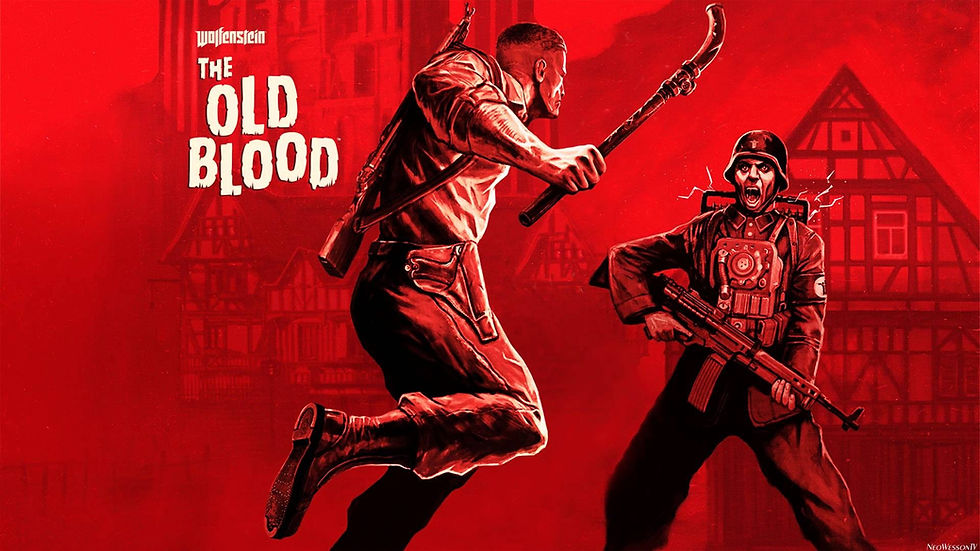
A funny thing happens to the Wolfenstein franchise after The New Order. It bifurcates into to opposing, yet equally valid, directions. The Old Blood, a smaller standalone release, sits at one end of the spectrum by being a stripped back, no frills prequel taking place during an operation directly before the opening of The New Order. Its a pulpy WW2 spy action story throwing back to classic Wolfenstein while keeping all of the series' modern innovations.
Starting with gameplay, its stronger on the whole thanks to more reigned in, tight level design. As BJ is returning to Castle Wolfenstein, its as if the series is returning to its natural habitat. Cramped stone corridors are the name of the game, but through its short campaign, The Old Blood is able to tour the player through many distinct locales. Whether you're crawling through the bowels of the castle, visiting a scenic village nearby, or raiding a subterranean catacomb, the scenery is unique and stimulating. With levels being smaller, the combat arenas are more strategic, enemy placements more intuitive, and secret areas more rewarding to find.
Being set in 1946, weapon selection is limited, but The Old Blood finds time to add new weapons that change the feel of this title completely. Its a treat to get to use the '46 variations of the weapons for more than an hour, and the grenade launching pistol and precision bolt-action rifle are welcome additions to BJ's arsenal. Even without alternate firing modes and laser guns, The Old Blood's gameplay felt, at least to me, a major upgrade to The New Order's. Firstly, there's no LaserKraftWerk to worry about, so there's no weapon wheel shenanigans and useless navigational obstacles, and secondly, the level design was more focussed. Where New Order has breadth, Old Blood has depth. Instead of designing locales to dazzle the viewer with alternate history worldbuilding, each environment here accepts standard WW2 aesethics so it can focus entirely on making purely fun levels.
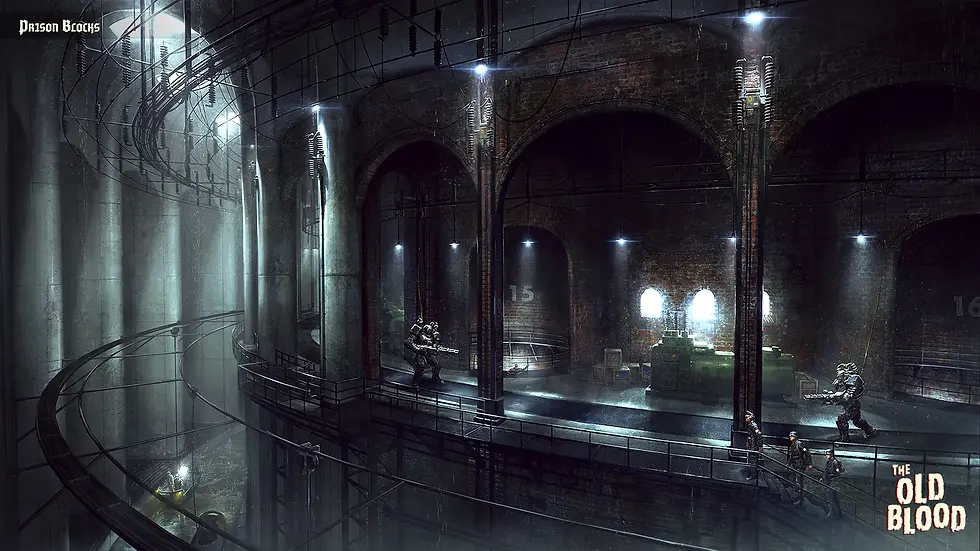
The Old Blood's story could have been a phoned-in nostalgia trip, but this game has a pretty decent narrative that, while nothing special, has its moments. We start by establishing that BJ's mission is to infiltrate Castle Wolfenstein and grab a dossier regarding General Deathshead that will allow the Allies to make their final assault. It goes awry, leading BJ and his partner Wesley getting captured in the game's first part, and in the second, BJ escapes to a nearby village to stop the Nazis from awakening a supernatural evil. The campaign, despite its shorter length, allows for more than just standard shoot-and-stealth gameplay. We've got mech sections, new enemies, and even a full-tilt lean into the supernatural as we near the end. This fantastical twist makes an impact because we start this game as disempowered as we ever are in this series. Raking droves of enemies with a mech is a far cry from climbing out of a pit with a broken pipe.
When it comes to characters, BJ is in rare form. This entry tries to strike a balance between soulful, warrior poet BJ and Nazi killing strongman BJ. He's funnier here. The story leans on its pulp influence to throw in some comedy every once in a while, and this change in tone is something I appreciate. The New Order isn't without its quips, but its overall dire tone influences more than just the story. In The Old Blood, I no longer felt the pressure that The New Order put on me in story or in gameplay, so being able to experiment, run-and-gun, and just have fun was something I could allow myself with this title without being severely punished. See? Presentation matters.
Other characters include Wesley, who originates BJ's "breathe, count to four, exhale" chestnut; Kessler, BJ's German informant; Pippa, the most British woman who ever lived; and Annette, who feels like a real person who wandered into this freakshow of a story. While BJ only crashes into these people's lives briefly, they make their impact on the player and BJ himself. The antagonists are more Nazi commanders with big personalities. Rudi Jäger is charismatic because he can be (seemingly) reasoned with, but when his dog is harmed, he goes berserk. And then there's Helga von Schabbs, the head of the Nazis' digging operations to unearth the tomb of King Otto I. What I like about Helga and Jäger is that they have believable traits and flaws in addition to being a Nazi. Their characterizations they occupy opposing extremes. Jäger embodies fitness and strength with his Aryan features and muscular build while Helga is an amputee who is defined by her historical and intellectual acumen. In the end, they're both undone because, whether through brains or brawn, they seek to control what cannot be controlled, like any fascist
I have very few critiques for this game. Difficulty spikes can sometimes be severe, and the opening stealth sections leave a poor first impression, but otherwise, The Old Blood is a marked improvement over its predecessor, and is an emphatic That Good. Now that we've explored the past, its time to blast violently into the future, with...
The New Colossus:

Oh, The New Colossus. I love you, you big, beautiful idiot. If the Old Blood is defined by its more reserved, careful level design and story, this game is the opposite extreme, defined by its over the top bombast in all regards.
The name of the game here is disappointment, but not because this game isn't what I expected it to be, but rather, it doesn't live up to its own promises. Firstly, this isn't the reason for "The Fall of Modern Wolfenstein," like anti-woke grifters or YouTube video essayists might imagine. A lot of people will say this game "jumped the shark," and I initially pushed back on that argument—really, the game series with MechaHitler?—but it can't be denied that there's a distinct point where The New Colossus goes past the point of no return. I, for one, don't begrudge this. Its the natural arc for a series like this, and as America gets more and more politically polarized, I don't have time for a sensible and reserved take on killing Nazis. The real flaw with TNC's approach isn't about concept, but execution.
The first half of this game is rock solid. Picking up minutes after the end of The New Order, BJ is blown to bits and sent into a 5-month coma, waking up when Engel corners the resistance. The opening hours of this game are a riot, with BJ rolling through the underwater corridors of a submarine in a wheelchair, spraying Nazis down with a submachine gun until he reunites with his comrades and confronts Engel. Yes, the cutscenes are a bit much, but on a first playthrough, I don't think they're a problem. Like the first game, this narrative is defined by an originating tragedy. The resistance loses their leader, making their mission to liberate of America seem even more impossible
Already, the tones are dueling, but the first half of the game knows how to keep it together. BJ, at the end of his rope, thinks back on his childhood, so between all this bombastic Nazi killing action, we have harrowing sequences depicting memories of his abusive upbringing at the hands of his father. Making the player aim their shotgun at his dog, Bessie, is a downright evil move on the part of devs, and singlehandedly makes Rip Blaskowizcs reprehensible...oh, and all the slurs and stuff. BJ's internal melancholy is juxtaposed to the surreal world of Nazi-occupied America, which keeps the two tones in a delicate equilibrium. (If there's something I can relate to, its me getting sadder as the world get more ridiculous.) Its one hell of a gamble, but it when it works, it delivers some of the best satire this series has to offer. BJ's running monologue being addressed to Caroline, the fallen resistance leader, is a beautiful, ingenious touch that emphasizes his mortality (and his pen game.)
Its the second half of the game where the cracks start to show. The game makes a crucial writing decision that basically flushes all the delicious irony its story had been serving down the drain. In order to empower the player with new gameplay mechanics, BJ no longer ruminates on his mortality, and in fact, is feeling better than ever. Without this key element of his character to balance the game's tones, we slide full-tilt style over substance territory until the end of the game.
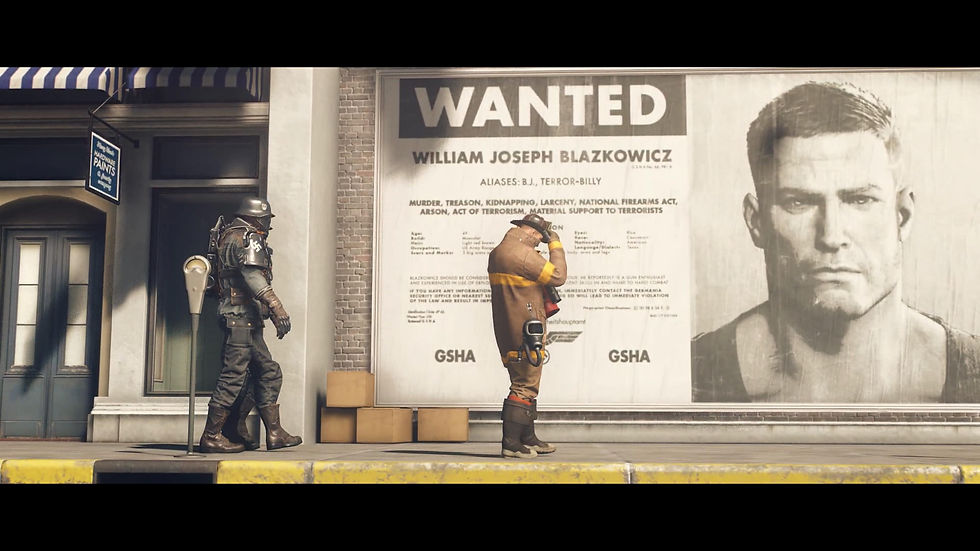
The first half of the game is working with really interesting themes, most notably the idea that Americans were more like Nazis that they wanted to believe, as seen in BJ's father. But after the midpoint, TNC just abandons most of its thematic efforts in lieu of final act spectacle. The game thinks its about revolution, but that's practically a background element as what its really discussing is America's past, not its future. Nazi-occupied America being a parody of itself is a thin tightrope to walk but the game does pull it off in its opening hours. Besides Hitler being depicted as a film set tyrant, there's just very little thematic or satirical material to chew on in the game's closing hours, which is a real shame. But no, I don't think The New Colossus "jumped the shark." This game isn't the smoking gun that some people what it to be. Whether this game was a victim of executive meddling or plain laziness, its sad to see it end like this.
Just as the story flattens in the latter half, so does the gameplay. The New Colossus, on paper, is the ideal Wolfenstein experience. It brings back some weapons and mechanics from The Old Blood and cuts the fat from The New Order, namely, its reliance the LaserKraftWork for non-combat traversal and puzzles. It throws in some new weapons and mechanics, too, just for good measure. You can even Gunzerk now, (where my Borderlands 2 fans at?) meaning that you can dual wield any combination of weapons you want without the previous games' speed penalty. At first, it feels fantastic. The weapons get a facelift, looking their best and feeling better than ever. One-shotting enemies with the throwable hatchet is orgasmic, and the sheer speed at which you can run across the battlefield, collect health and armor, and get back into the fight makes the player feel like they're a one man army. So what went wrong?
Fundamentally, The New Colossus doesn't have enough tricks up its sleeve to sustain its length. The core gunplay is amazing, without a doubt, but in terms of design, it becomes clear that every combat encounter is the same song and dance. You enter a room in stealth, kill your way through it, inevitably get caught, and have to end things in a firefight. Its frustrating that this game especially emphasizes stealth while implementing it the worst. Detection is basically a coin-flip, and I can count on a single hand how many times I got through an encounter without being seen.
Level design is a step down across the board, unfortunately. Besides some standout locales like New Orleans and Venus, most levels are industrial Nazi facilities with a more sci-fi makeover. Navigating these cramped corridors should bring back memories of Wolfenstein 3D or The Old Blood, but really, it just makes double shotguns the dominate strategy, so every gunfight plays out the same. Heavy weapons taken off of big robot Nazis play a huge role here, as they can turn the tide of fight considerably, but you'll be using them so often that they might as well be part of your own arsenal.
The game tries to fix its gameplay and story deficit with the Enigma Code side missions. The commander system remains, but this time, you take Enigma Codes with you off their bodies, unlocking side missions where you return to main levels to basically grind for weapon upgrades—a system I did not engage with at all because that sounds like agony. These upgrades do change the way your ole reliable guns behave, but some just function exactly like guns from previous games do, which is a massive disappointment. You access Enigma missions from the Evas Hammer, your submarine base, which is a marked improvement from the Berlin hideout, as it feels like a living, breathing space where you can observe your allies conversing with each other and pursuing hobbies. While I liked that its populated with numerous NPCs that fill the ranks of the resistance, I hate they they are the main quest givers, since they mean nothing to me. They'll be handing out these fetch-quests even after the credits role, but its all just a band-aid solution the game's real problem:
Its just more Wolfenstein.
Even after all that shit I just talked, I still love this game. I love the way it looks, the way it sounds, and what its try to say...when its actually trying to say something. A quantum leap in graphical fidelity can be seen between this game and the last. TNC, more than half a decade after release, still looks stunning. We've plateaued in terms of graphics these days, so where its look really shines is in the art direction, which creates a retro-futuritstic 1960's out of idyllic propaganda of both Nazi and American origin. (Any wonder they go so well together?) This game is bursting with bright colors, garish fashion, and anachronistic flare and I'm smitten with it. When I think of this game, I conjure the sensory detail of the leather on BJ's new jacket, the carpet of the Venus base's floors, the radiance of fire through the dark New Orleans streets. To me, this is the pinnacle of photo-realistic graphics. It looks enough like real life to pass through the Uncanny Valley while incorporating damn good art direction that gives character distinct, nearly cartoony/comic booky features.
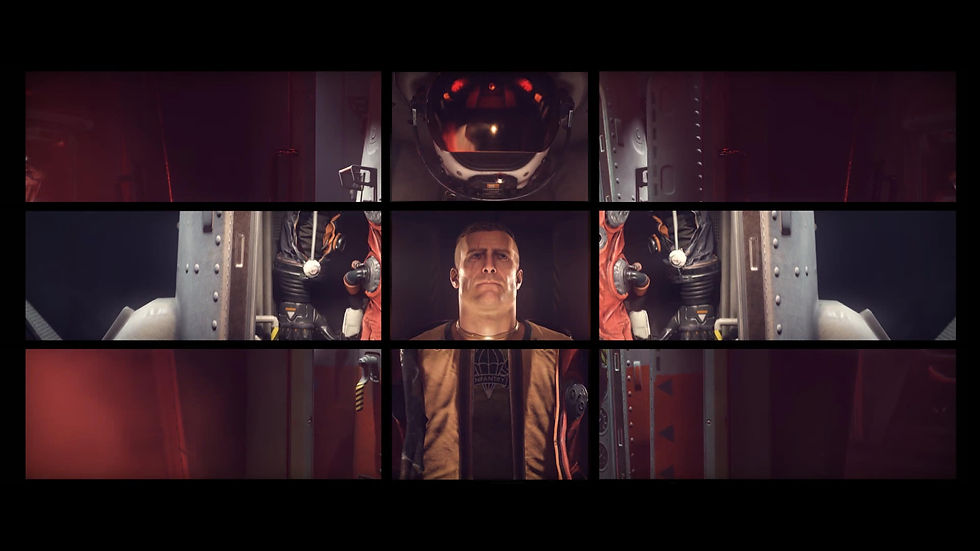
I haven't talked about the music thus far, because honestly, I haven't really noticed it, but The New Colossus' use of cinematic sequences and montage creates an emotional tether to some of its tracks. The sound mixing in all of these games is ass, meaning that the player isn't likely to really connect to most songs because dialogue and gunfire will drown them out, but tracks like "Bazko Kill the Nazis," "Amazing Grace," and "Area 52" stand out to me. You can tell there's a change in tone between games because the track titles for The New Order are pretty tame, mostly referring to places and characters, and when not, they reflect the more dour tone with names like "Concrete for Miles," or "Adrift," while The New Colossus is more tongue-in-cheek with names like "Horton Hears a Revolution," and "Reich Between The Eyes." This heavy rock and electronic sound isn't my thing, but given how the soundtrack has put the fear of God in me during some particularly hectic fights, I'd say its doing its job.
Obviously, I had a lot to say about The New Colossus, and even though its full of problems, its my favorite of the series. Determining if its That Good is complicated. The game has higher scores on average than The New Order, and in many ways, I understand why. It looks better, plays smoother, has more personality, and its highs are higher. The lows, however...actually, no, the lows are not lower. Fuck you, LaserKraftWerk. Still, this game is far from perfect, and suffers from some issues that are entirely self-inflicted. Its got repetitive gameplay, a half-hearted narrative, and is practically unfinished. I'll echo Raycevick's point and say that The New Colossus is a great high that comes with one hell of a crash. With the second American revolution sparked, it time to move onto the next game in the Wolfenstein franchise...
Youngblood:
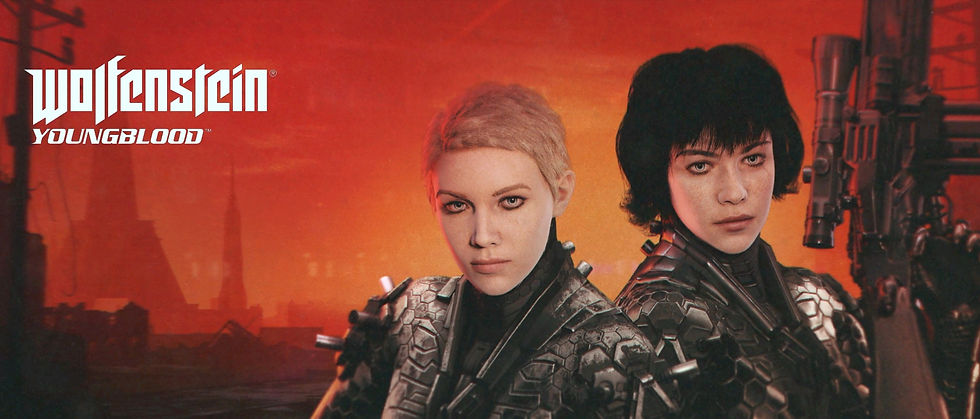
This game had me wondering if I should change the title of this series to "That Bad." If The New Colossus is disappointing, Youngblood is straight up embarrassing. I'll be 100% honest with you—I didn't even finish this game. Hell, I hardly started it, as I quickly understood exactly what it was and knew my time was better spent elsewhere. Youngblood doesn't directly continue the franchise's story, instead opting to fling wildly into the 80's, where the Nazi empire still stomps around Europe. With BJ's twin daughters, Soph and Jess, grown enough to shoot Nazis, we play as them as they look for their father, whose disappeared from their Texas home. Not an awful premise, if you ignore everything about it.
Baffling. That's how I'd describe the experience of playing what I played of Youngblood. I was baffled by the game's premise, its tone, its structure, and basically every decision made behind the scenes to make this game what it is. Modern Wolfenstein was defined by its linear, cinematic structure; design that brought out the best in its gameplay and story, but Youngblood chooses to be Far Cry style semi-open world looter shooter co-op RPG? Basically the antithesis of what fans and critics like, and expect, from Wolfenstein. This series mutating into a pseudo live service abomination is a far cry (lmao) from the complete, cohesive experience that was The New Order. No—they don't make them like these used to.
Youngblood isn't bad because its different; its bad because it can't even execute well on anything it wants to be. Its a looter shooter without loot, an FPS with badly grafted on RPG elements, a Wolfenstein game with poor stealth, boring combat, and a lack of story. Instead of the tightly designed structure of specific locales that these games have made their bones on, Nazi-occupied districts of Paris are home to Youngblood's open world missions. Sure, The New Colossus had samey environments, but this is just phoning it in. The game begins with a standard linear level, but its more of an appetizer to placate fans as the rest of the game unfolds into a grind-fest involving mostly fetch-quests in the open world to make your numbers go up. After my first foray into Little Berlin, I gave up. I knew this game for what it was: a time waster. Everything about it was designed not to entertain me, but to waste my one and only life on this Earth, and I do not regret my choice to quit while I was ahead.
If you want to know more, enjoy SkillUp's review of the game, which goes in depth...since he actually finished it.
There are even more things to complain about, like the game's painfully 2010's bid for 80's nostalgia, the poorly directed voice performances, the awful writing for the main two characters, the poor art direction, worse readability, and half-assed RPG mechanics. I'm genuinely confused as to who Machine Games thought this game was for. Did they think that we'd fall in love with BJ's two idiot daughters, who are supposed to be 18 but act like they haven't yet hit a birthday with two digits in it? Were we supposed to be intrigued by a story that doesn't feature nearly any of the characters we've grown to like over three games? That skips decades in a series renowned for its worldbuilding? A less cynical version of me would sit with this bewilderment and chew on it for a while, but I know that this game was made to chase trends, not to be the next chapter in the Wolfenstein franchise.
I don't like critiquing things for what they aren't, but looking at the bright side, the game's title not having "New" in it means that, potentially, this isn't the end of the line for the franchise. With The New Colossus' ending only being the spark that ignites rebellion, cutting 18 year later leaves a lot to be filled in. That's 2 decades of Nazi killing we're missing out on, and a future game could be a prequel set within this time period, which would actually show us the actual events of the second American revolution (—you know, the entire point of The New Colossus' story!) There's so much more to be explored in this world. I mean, the Baby Boomer generation is being born in Nazi America, and I gotta know how much worse they turn out. And the concept of a co-op Wolfenstein isn't a bad one, and in fact, I hope they reuse the concept in the future, since I think it could go hand-in-hand with the timeline premise. Imagine you play as BJ, but in this timeline you picked Wyatt, so a friend could join your game as him to fight alongside you. Story-gameplay integration, baby. Machine Games have moved on to making Indiana Jones and The Great Circle, but I do hope that one day they get to make the third real installment of this franchise. If there's anything we need in 2025, its more dead Nazis.
Conclusion:
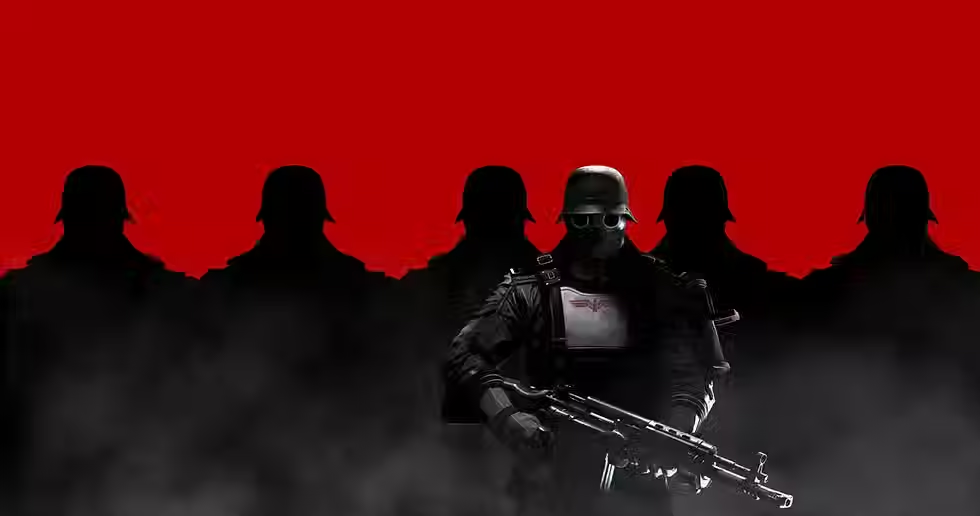
So, are the "New" Wolfenstein games That Good? Yes. Kinda. Obviously, I have close kept opinions and biases, but with the "Alt History Collection" putting all four games in one place, I strongly encourage anyone with a machine that can run these games to go out and play them. The New Order is a gem, The Old Blood is a classic refined, The New Colossus is bold and ambitious, and Youngblood is, mercifully, ignorable. Every game has its problems, and these kinds of games aren't for everyone, but if you're like me, and you chase something familiar but with a neat twist, these are waiting for you.
While writing this, Amazon revealed that they are working on a Wolfenstein show, a la their Fallout series. I'm hoping its an adaptation we'll talk about in the same breath as the likes of Netflix's Castlevania and not Netflix's Devil May Cry. I'm worried about how they'll handle it, since I've become quite the fan of these games not weeks before this announcement. Of course, we don't know what the show will actually be adapting, but...come on. My most selfish hope for the show is, beyond Alan Ritchson cast as BJ, that it brings attention to the IP and we get the Wolfenstein game we all deserve.
As Nazism rises in America, more and more often do I think "What would BJ do?" Kill them, obviously. More practically, what we can learn from Wolfenstein is that the first step to fascism is losing your empathy. Let them take that from you, and you're already lost. Its been a rough year, and its been rough for a while longer than that for so many people around the world, and I have the luxury to play video games and write about them for fun. I'm not an activist, just some shmuck with opinions, but I'll never hold my tongue about this:
Fuck Nazis, play Wolfenstein.
